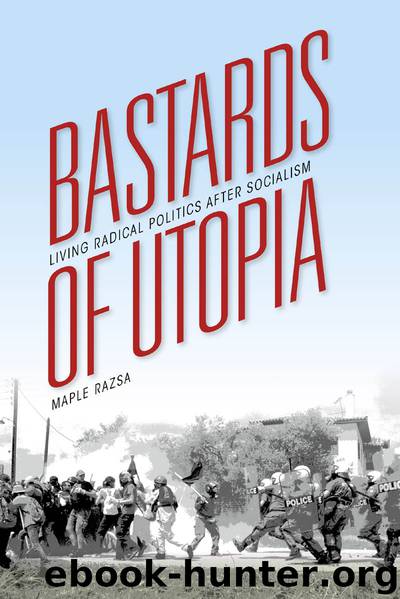Bastards of Utopia by Razsa Maple

Author:Razsa, Maple
Language: eng
Format: epub
Publisher: Indiana University Press
Published: 2015-03-11T16:00:00+00:00
The Effects and Limits of Mass Mobilization
As in the earlier countersummits of the late 1990s and early 2000s, the mobilization for Thessaloniki reactivated, intensified, and personalized networks that activists more commonly experienced electronically. Participants ate, traveled, and dwelled closely together in difficult and politically charged circumstances, initiating new cycles of reciprocal hospitality. Despite the sometimes acute factionalism that marred Thessaloniki, militant formations with different traditions, tactics, and styles were arrayed together. As they formed a multiheaded hydra moving through the city or a vast swarm charging the Red Zone, they made concrete for participants the irreducible complexity of the “movement of movements” as well as some of its many commonalities. These were not only commonalities of the lowest common denominator—of the “no” shouted at those gathered inside the red zone—though the discovery of a common enemy was by no means insignificant. Activists were also aware that they organized these convergences without any overarching sovereign power, without recourse to any centralized authority. Their encounters with other political traditions and approaches, the unexpected intersections of forms of organization, sensibilities, tactics, references—intersecting here, diverging there—helped to produce a concrete awareness of a collective subject that exceeded the sum of its parts.
By 2003, however, there were also signs that the alterglobalization movement was in crisis. State security forces—which had been caught off guard by the decentralization, pluralism, and militancy of the first globalization protests in Seattle and Prague—launched militarized attacks on subsequent demonstrations in Gothenburg, Genoa, Evian, Miami, and Thessaloniki. State violence against demonstrations, the struggle for media attention, as well as activists’ anger with the invasion of Iraq despite protests of historic size, among other factors, generated a dynamic of increasing physical confrontations at later countersummits. Many European activists felt this dynamic reached its apotheosis in Thessaloniki. The movement’s crisis was palpable in the atmosphere of fear and suspicion that pervaded Aristotle University’s campus. The crisis was also evident in the eclipse of the innovative video practices that had characterized earlier mobilizations. In such circumstances, my participatory research—especially as it involved video recording—also became impossible in Greece. Indeed, I did not ask the details of what my collaborators did during the Saturday actions—for fear of incriminating them—and they did not tell.
Ironically, however, if the near impossibility of shooting video was one indicator of the crisis, the ways the technology was and was not used in Greece also offer a revealing point of entry for understanding activists’ experience there—as well as how such emotionally charged, sensory, and embodied experiences are materialized, circulated, deployed, and reanimated by activists. Sometimes such uses are part of a self-conscious effort to intervene in activists’ emotional states, in activists’ formation as political subjects. Attending to how video was or was not taken up in Thessaloniki also highlights a series of significant ambiguous subjective effects generated by the trajectory of intensifying confrontations. For example, the impossibility of shooting video was one sign—like a canary falling silent—of the vulnerability of activists’ subjective efforts to engage state violence.
While state violence obviated activist
Download
This site does not store any files on its server. We only index and link to content provided by other sites. Please contact the content providers to delete copyright contents if any and email us, we'll remove relevant links or contents immediately.
| Anarchism | Communism & Socialism |
| Conservatism & Liberalism | Democracy |
| Fascism | Libertarianism |
| Nationalism | Radicalism |
| Utopian |
The Secret History by Donna Tartt(19003)
The Social Justice Warrior Handbook by Lisa De Pasquale(12177)
Thirteen Reasons Why by Jay Asher(8874)
This Is How You Lose Her by Junot Diaz(6857)
Weapons of Math Destruction by Cathy O'Neil(6249)
Zero to One by Peter Thiel(5768)
Beartown by Fredrik Backman(5719)
The Myth of the Strong Leader by Archie Brown(5482)
The Fire Next Time by James Baldwin(5409)
How Democracies Die by Steven Levitsky & Daniel Ziblatt(5200)
Promise Me, Dad by Joe Biden(5132)
Stone's Rules by Roger Stone(5066)
A Higher Loyalty: Truth, Lies, and Leadership by James Comey(4939)
100 Deadly Skills by Clint Emerson(4901)
Rise and Kill First by Ronen Bergman(4761)
Secrecy World by Jake Bernstein(4727)
The David Icke Guide to the Global Conspiracy (and how to end it) by David Icke(4685)
The Farm by Tom Rob Smith(4489)
The Doomsday Machine by Daniel Ellsberg(4474)
